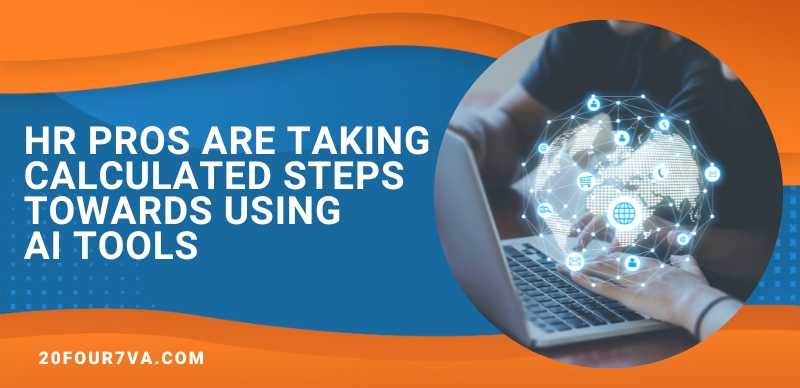HR Pros are Taking Calculated Steps Towards Using AI Tools

The road ahead seems to be paved by artificial intelligence (AI). There are plenty of practical uses of this technology—ChatGPT being the current face of the AI movement, but there are also people who are shying away from such tools because of the potential risks. And the wariness is understandable.
However, turning away from AI without thoroughly assessing the benefits and looking into best practices can be detrimental not only to one department but the organization as a whole. Human resources (HR) plays a big role in acquiring the right talent, building a positive company culture, and working toward future organizational success. Not taking advantage of AI for human resources can be a costly mistake.
Benefits of AI for the Human Resources Industry
As has been proven over and over since ChatGPT became available for public use, utilizing AI tools benefits businesses in various ways. But Carol Kiburz, VP of HR for Halff, stressed the importance of AI specifically for HR practitioners. During her speaking engagement at the SHRM Annual Conference & Expo 2023 in Las Vegas, she acknowledged that AI has its drawbacks. But if HR professionals can use AI responsibly and in a way they’re comfortable, they can be “more knowledgeable, nimble, and gain a seat at the table.”
Here are some projects where AI, with the proper usage guidelines, can be a helpful tool for HR teams:
- Training Manuals
- Email Templates
- General Announcements
- Employee Onboarding Tools
- Candidate Screening
- Employee Assistance
- And more
Reasons for Reluctance to Embrace AI
Despite the numerous benefits that AI can offer (e.g., speed, productivity, etc.), there are still people who are wary of AI tools. These are some of the top reasons for HR professionals’ wariness about AI for human resources, particularly generative AI tools like ChatGPT:
Lack of Sources
Unlike search engines, ChatGPT responses don’t include sources. This popular AI tool scrapes the internet for answers at a lightning-fast speed, but the responses can be filled with errors. In the HR world, these mistakes can affect a company’s credibility and even cause negative employee or candidate experiences.
Job Loss Fears
AI tools can do some routine tasks relatively faster and more efficiently than humans. And while AI cannot replace the experience and critical thinking skills of seasoned HR specialists (yet!), the advanced leaps in AI are enough to make many employees worry about job security.
Legal Risks
There are also worries about legal risks, given the lack of sources and the possibility of erroneous AI-generated text. And without the right usage guidelines, employees are also at risk of violating privacy or copyright laws. Those who are worried about the legal repercussions of such violations are understandably shying away from utilizing AI tools for business processes.
Data Security Issues
There have been multiple reports about employees unknowingly breaking data privacy rules by using confidential information on tools like ChatGPT. Big corporations like Samsung experienced this first-hand when they temporarily lifted their ban on the tool. This mistake can be costly, especially for companies that have highly confidential business and customer information.
Taking a Step Forward: Using AI Responsibly
Utilizing AI for human resources can make processes like sourcing the right talent, engaging with employees, and developing a solid company culture easier and more cost-effective. Yes, it does come with some drawbacks and can have serious repercussions, so the wariness towards its adoption is understandable. But the potential risks should not freeze progress.
Instead of completely turning away from technology, HR experts should assess the risks thoroughly. Doing so can help them set up the right guidelines and parameters for the responsible use of AI tools. For example, training recruiters to avoid using certain prompts for candidate screening software can help prevent gender bias and support equal-opportunity hiring initiatives.
Navigating Artificial Intelligence: A Balanced Approach
AI tools may be smart, but they still depend on the input of humans. That means they can only be as good as the people navigating them. And when they do have errors or violate rules, it is up to humans to correct them. As such, companies should provide the right training for workers who will be using AI tools. Additionally, setting up internal guidelines and standards is crucial to using AI responsibly as a company.
[activecampaign form=68]











